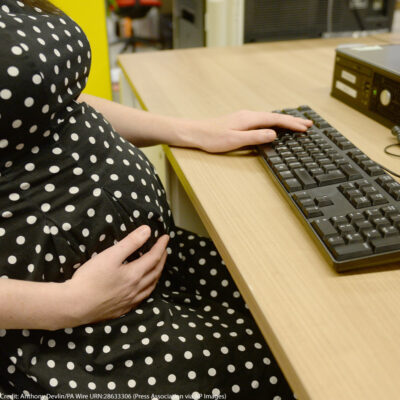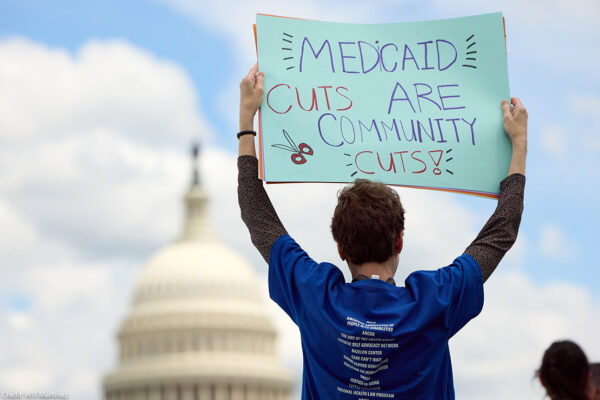
The Decade-Long Fight for Pregnant Workers
July 20, 2023
On Tuesday, June 27, more than a decade after its first introduction in a congressional committee, the Pregnant Workers Fairness Act went into effect, changing the landscape of work for all pregnant people. Before this law, many pregnant workers had to decide between protecting their jobs and protecting their health.
While there have been efforts in the past to protect pregnant workers, employers have always found loopholes to avoid providing accommodations. Against their judgment and against their doctorsā judgment, pregnant workers have had to lift heavy objects, stand for hours on end, and expose themselves to hazardous chemicals. This will no longer be the case thanks to national advocacy efforts, including those from us here at the Ķųŗģ±¬ĮĻ.
Today, weāre speaking with Vania Leveille, senior legislative counsel in the Ķųŗģ±¬ĮĻās National Political Advocacy Department, who will share more about the mammoth undertaking that moved the law to its passage, and Gillian Thomas, senior staff attorney for the Ķųŗģ±¬ĮĻās Womenās Rights Project, who will detail what the act looks like in practice.
In this episode
Kendall Ciesemier

Listen to this episode on
This Episode Covers the Following Issues
Related Content
-
News & CommentaryAug 2025

Civil Liberties
Disability Rights
Congress Cuts Medicaid To Fund Ice: How H.r. 1 Harms Communities. Explore News & Commentary.Congress Cuts Medicaid to Fund ICE: How H.R. 1 Harms Communities
Congress voted to gut Medicaid and ādefundā Planned Parenthood to fund President Trumpās anti-immigrant agenda. We wonāt allow it.By: Deirdre Schifeling -
Press ReleaseAug 2025

Immigrants' Rights
+2 Issues
Aclu Raises Alarm Over Trump Administration Seeking To Ban Non-citizens From Accessing Community Health And Education Programs. Explore Press Release.Ķųŗģ±¬ĮĻ Raises Alarm Over Trump Administration Seeking to Ban Non-Citizens from Accessing Community Health and Education Programs
WASHINGTON ā The Ķųŗģ±¬ĮĻ has filed a public comment in opposition to the Department of Health and Human Servicesā (HHS) unlawful, harmful, and sweeping directive seeking to exclude immigrant communities from participating in vital community health and education services that benefit everyone. Last month, HHS issued a directive declaring that 13 programs will no longer be open to all and will instead for the first time be considered programs restricted under a law enacted nearly three decades ago, the Personal Responsibility and Work Opportunity Reconciliation Act (PRWORA). These programs include community health centers, mental health and substance use treatment programs, Head Start, the Title X Family Planning Program, and many others. The directive conflicts with PRWORA and upends longstanding guidance respected by four prior administrations. āThis arbitrary and harmful directive exemplifies this administrationās tunnel vision, which prioritizes its anti-immigrant crusade, no matter the harms,ā said Ming-Qi Chu, deputy director of the Ķųŗģ±¬ĮĻ Womenās Rights Project. āIf HHS does not abandon this cruel and unlawful directive, hundreds of thousands of children will have their early childhood education disrupted, millions will lose access to life-saving health care like family planning services, cancer screenings, and addiction treatment, and many people with disabilities, including U.S. citizens, could have their care delayed due to bureaucratic immigration status checks. It serves no oneās interest to deny people these essential services, and HHS must withdraw this incredibly misguided directive.ā The Ķųŗģ±¬ĮĻās comment highlights that the directive is unlawful, arbitrary, and capricious, fails to meaningfully consider the impacts of the action, and will harm communities across the country ā from children in schools, to people with disabilities, to low-income families denied essential health care, to people recovering from substance use disorder, to survivors of gender-based violence. The comment also notes that the directive will cause a chilling effect that harms immigrant communities that remain eligible, including for mixed status families and others who may be fearful or confused about whether seeking health care might expose them to immigration enforcement or retaliation. āThe Directive has triggered chaos and uncertainty both for administering agencies and the individuals, families, and communities who rely on the services at stake. [ā¦] It will deprive children of access to crucial early educational programming and undermine access to essential and life-saving health care for children and their families. It will also disproportionately burden mixed-status families, people with disabilities, and survivors of gender-based violence,ā the comment reads. The comment is available here: /documents/aclu-comment-in-opposition-to-hhs-directive-on-prwora -
Press ReleaseAug 2025

Racial Justice
+2 Issues
Educators, Aclu, Nea-nh, And Glad Law Sue New Hampshire Over Yet Another Unconstitutional Attack On Diversity, Equity, And Inclusion. Explore Press Release.Educators, Ķųŗģ±¬ĮĻ, NEA-NH, and GLAD Law Sue New Hampshire Over Yet Another Unconstitutional Attack on Diversity, Equity, and Inclusion
CONCORD, N.H. ā A diverse group of educators and advocacy groups filed a federal lawsuit today challenging a new anti-equity, anti-inclusion, and anti-diversity law in New Hampshire, which became effective on July 1, 2025, after being signed into law by Governor Ayotte in late June. The law, contained within House Bill 2ās budget provisions, seeks to ban diversity, equity, and inclusion programs pertaining to race, gender, sexual orientation, gender identity, and disability in New Hampshire schools (including both K-12 public schools as well as both public and private colleges and universities) and public entities like police departments and libraries. According to the lawsuit, this law radically contradicts federal civil rights laws that protect the rights of students with disabilities, violates the First Amendment rights of educators and students, and is vague and ambiguous under the United States and New Hampshire Constitutions. Megan Tuttle, NEA-New Hampshire president, stated, āAll Granite State children deserve a high-quality education, safe and welcoming public schools, and the support they need to thrive. We know diversity, equity, and inclusion programs and initiatives are not only legally required in certain contexts but also create a sense of belonging where all students can feel comfortable sharing their ideas and stories. Vague and confusing laws that have the effect of censoring or limiting educatorsā abilities to teach and accommodate students who may have special education needs can undermine the high-quality education that students deserve. New Hampshire educators are standing together against HB 2ās unconstitutional attack on those programs and standing up to politiciansā overreach into our classrooms. Our profession should be guided by whatās best for our students, not the threat of funding restrictions and punishment. We will never stop working to make sure every child feels safe, seen, and is prepared for the future.ā The lawsuit was brought by the stateās largest educator union, National Education Association ā New Hampshire (NEA-NH), four school districts (Oyster River Cooperative School District, the Dover School District, the Somersworth School District, and the Grantham School District), trainer and consultant for diversity, equity, and inclusion James M. McKim, Jr., diversity, equity, and inclusion administrator and psychology professor Dottie Morris, and New Hampshire Outright, a nonprofit that provides training in public schools and entities on creating environments of inclusion and belonging for LGBTQ+ students. They are represented by lawyers from a broad coalition of organizations and law firms, including the Ķųŗģ±¬ĮĻ of New Hampshire, the national Ķųŗģ±¬ĮĻās Disability Rights Program and Racial Justice Program, National Education Association-New Hampshire (NEA-NH), GLBTQ Legal Advocates & Defenders (GLAD Law), and Drummond Woodsum & MacMahon. Devon Chaffee, executive director of the Ķųŗģ±¬ĮĻ of New Hampshire, said, āThis new law threatens to revoke critical public funding from Granite State schools using vague criteria unless they cease programming and policies aimed at fostering equitable and inclusive environments for all ā and thatās unconstitutional. Just like with our other two lawsuits, we will continue to fight these unwarranted and unconstitutional attacks on diversity and inclusion efforts and our right to learn.ā The law does not just seek to prohibit diversity, equity, and inclusion in public entities and public schools, but it also seeks to strip away millions of dollars in critical state (and possibly federal) public funding if K-12 public school districts guess wrong as to how the New Hampshire Department of Education interprets the vague lawās provisions. According to one estimate, state aid to school districts could amount to more than $1 billion annually. John Shea, the superintendent of the Somersworth School District, said, āLooking at HB2ās attacks on diversity, equity, and inclusion, Iām worried that our legislature and our politicians may have lost sight of what these three words actually represent -- and just how important they are to our public education system. āDiversityā simply is who we are here in Somersworth. Itās not a program, initiative or ideology. It cannot be legislated away. And equity -- or more particularly āequitable opportunityā -- is fundamental to the very idea of universal public education. As is āinclusiveness,ā one of our communityās most cherished values. We strive for a welcoming environment for all, one that is strengthened by diverse perspectives. The Stateās attacks on diversity, equity, and inclusion are an attack on all of this. Special education, ESOL programs (English for Speakers of Other Languages), and the free and reduced meals program included -- among many other examples. We have no choice but to fight the anti-DEI elements of HB2.ā Zoe Brennan-Krohn, director of the Ķųŗģ±¬ĮĻ Disability Rights Program, said, āNew Hampshire's anti-DEI law is an expansive assault on the rights and freedoms of students and educators across the state. Among those potentially swept up in this vague law are students with disabilities, many of whom rely on accessibility and integration programs to succeed at school. Federal disability rights laws require public schools to identify disabled students to increase their achievement; state law cannot prohibit what federal law mandates.ā The law is already arbitrarily and selectively being enforced by the state Department of Education, which is aggressively applying it to private (including religious) colleges and universities that receive student scholarship funds through state grant aid programs (like UNIQUE Program state grants and the Governorās Scholarship), but apparently not private K-12 schools (including religious schools) that receive public funds through Education Freedom Accounts. The law also applies to private colleges and universities (for example, Dartmouth College, Southern New Hampshire University, and Saint Anselm College) that receive any form of state funding, including those that receive state scholarship grants that help New Hampshire residents attend these colleges. For public and private colleges and universities in New Hampshire, the stakes for Granite Staters are severe: the amount at stake includes over $22 million in annual UNIQUE Program state grants and over $2 million in annual Governorās scholarship program state grants, which are both distributed based on merit and need to New Hampshire residents who attend private or public New Hampshire colleges or universities. āThe lack of clarity about the expectations for how to comply with HB2ās anti-diversity, equity, and inclusion provisions, coupled with the severe and potentially devastating consequences a perceived violation may bring, have educators in a dilemma. As a result of this law, I am aware of several educators who will err on the side of caution out of concern and fear of engaging in some activity that might be perceived as diversity, equity, and inclusion related. The concern and fear of violating HB2ās directive will stifle educatorsā abilities to adequately serve all of their students, to create school environments that support students from diverse lived experiences, and to ethically engage in their vocation,ā said Dottie Morris, a college administrator focusing on belonging and psychology professor, who is a plaintiff in this case. She is bringing suit only in her individual capacity. Also at stake are the millions of dollars the State provides for operating costs. All of this scholarship money and operational funding could be ripped away if public and private colleges and universities guess wrong as to how to comply with the law or with the education departmentās interpretation of it. The lawsuit also raises concerns about how this law could impact school districtsā federally-mandated collection of demographic data, including racial and ethnic groups, in New Hampshire. James T. McKim, Jr., a plaintiff in the case and who works regularly with state and local government bodies to improve operations, including through diversity, equity, and inclusion practices, said, āI am joining this suit because I believe the diversity, equity, and inclusion provision in HB2 goes against our Live Free or Die nature. It is unconstitutional. And it is harmful not only to me personally and to those in the protected classes mentioned in the law, but also to White people in our state and beyond. The work of helping organizations live into diversity, equity, and inclusion helps everyone.ā As the law was still making its way through the legislative process, disability rights advocates expressed clear concerns that essential services, programs, and trainings aimed at helping the lives of people with disabilities could be dismantled by the law. The legislature failed to address these concerns in the final bill language that was ultimately signed into law. Jennifer Eber, litigation director for the Disability Rights Center - New Hampshire, who is not part of this lawsuit but opposed the law, said, āFederal laws require school districts to provide specialized instruction and related services to qualifying students with disabilities. These federal laws protect the fundamental right of students with disabilities to access a free appropriate public education. Disability Rights Center -New Hampshire opposes HB2's effort to undermine these federal laws and fully supports the request that the Court find HB2 both unconstitutional and preempted.ā The law also impacts LGBTQ+ students in New Hampshire and could be viewed as potentially requiring the removal of certain programming, for example, policies establishing non-discrimination protections for transgender students or making menstrual hygiene products available in gender neutral bathrooms. Heidi Carrington Heath, executive director of New Hampshire Outright, a plaintiff in the case, said, āN.H. Outright has been leading the way in caring for LGBTQ+ youth and their families for over 30 years. That includes a well-respected, evidence-based training program that many schools and communities across the Granite State have benefitted from. We know that creating healthier and stronger environments for LGBTQ+ youth does so for everyone. HB2 is an attempt to silence the voices of vulnerable Granite Staters and puts them at risk in a time when they need stronger supports than ever. We believe that it is critical to challenge this unjust law that is already causing harm to our organization, and communities.ā Hannah Hussey, staff attorney at GLAD Law, said, āThis law is yet another unconstitutional attempt by elected officials seeking to control and censor valued and trusted educational programs in New Hampshire simply because they donāt like them. Imposing vague bans on programs related to race, gender, sexual orientation, gender identity, and disability in our public schools and public and private colleges and universities will chill vital programs like special education services in our public schools, initiatives to increase the representation of girls in STEM, and other opportunities and resources to ensure equal opportunity for LGBTQ students, students of color, and students with disabilities. Such programs not only provide vital support for marginalized students, they contribute to an enriching environment for all students to get a well-rounded education, develop critical thinking skills, and learn to appreciate human differences.ā The court documents also outline how the law could forbid education programs designed to increase the representation of girls and women in STEM classes, the use of tuition waivers or campus recruitment efforts for older learners 50 and up, or opportunities for religious students through spiritual activities. This lawsuit follows several others filed in New Hampshire challenging anti-equity practices in education, including a 2021 lawsuit against a classroom censorship law that was struck down in federal court in May 2024, and one lawsuit filed on March 5, 2025 in New Hampshire by the Ķųŗģ±¬ĮĻ of New Hampshire, national Ķųŗģ±¬ĮĻ, NEA, and NEA-NH against the U.S. Department of Education. These practices were halted by the court in April 2024. Dr. Christine Boston, superintendent of Dover Public Schools, said, āThe Dover School District provides relevant and engaging learning experiences and curricula to each student, which could violate HB2ās anti-DEI provisions where such individualized instruction is for the purpose of āachieving demographic outcomesā and classifies students based on the groups listed in RSA 354-A:1. The District celebrates the diversity of our student body, pursues equity to provide an individualized education, and creates inclusive learning environments. This commitment is required by the City of Dover school board and the State of New Hampshire. According to the Educational Equity Policy ACB of the Dover School District: āThe ultimate goal of the Dover School Districtās educational system is to assure that each and every student, regardless of background, has access to relevant and engaging learning experiences and curricula that they will need in order to thrive today and into the future. This foundation will allow our students to become dynamic global citizens as they adapt to a rapidly changing world.ā HB2ās vague ban on, for example, 'critical race theoryā and āany program, policy, training, or initiative that classifies individuals based on a characteristic identified under RSA 354-A:1āānamely, age, sex, gender identity, sexual orientation, race, creed, color, marital status, familial status, mental or physical disability, religion or national origināāfor the purpose of achieving demographic outcomes, rather than treating individuals equally under the lawā makes me question whether the N.H. Department of Education and others could view the Districtās efforts to create relevant and engaging learning environments with well-rounded teachers and staff as violating HB2, thus jeopardizing much needed state and federal funding.ā Dr. Robert Shaps, the superintendent of the Oyster River Cooperative School District (ORCSD), said, āHB 2, as written, directly contradicts our legal responsibility to meet our obligations under a wide range of preexisting laws that require school districts to improve learning outcomes for demographic groups. It contains broad and ambiguous declarations coupled with unclearly defined prohibited practices and no guidance. These determinations are subjective and unreviewable, and conflict with our legal and ethical responsibilities to our students. The ability to provide and apply resources and services that ensure all students succeed academically is crucial to their success. In effect, the New Hampshire State Government is using financial force to impose an unclear directive regarding educational learning opportunities, despite its constitutional responsibility to provide adequate school funding without conditions. This unprecedented ability gives them the ability to immediately halt all sources of public funding without warning if a school or district, knowingly or unknowingly, fails to abide by any section of the anti-DEI provisions. We cannot stand by as the state attempts to bypass its own legal responsibilities while failing to provide due process to respond to violations and offering no chance of appeal. We hope this legal action will defend our right to deliver a high-quality public school education and support a democratic, informed, and engaged community as we work together to protect our childrenās future.ā Christine Downing, the superintendent of the Grantham School District, said, āThe Grantham School District is taking a proactive stance to protect its students and educational programs by challenging the diversity, equity, and inclusion prohibition language of HB2. The District is committed to providing a high-quality education that prepares students for a diverse, global society, grounded in principles of inclusion and equity. Due to a severe lack of clarity regarding what constitutes āDEI-related programs, initiatives, policies, and training,ā the District believes it's essential to seek legal action. Without clear guidance from the Department of Education, the District cannot risk the possibility of arbitrary and unilateral actions by the Commissioner that could halt all sources of public funding. Joining this legal action is a necessary step to ensure the District can continue to provide the education our community expects and our students deserve.ā The complaint is available here: /cases/national-education-association-new-hampshire-v-formella?document=ComplaintCourt Case: National Education Association - New Hampshire v. FormellaAffiliate: New Hampshire -
New HampshireAug 2025

Racial Justice
+2 Issues
National Education Association - New Hampshire V. Formella. Explore Case.National Education Association - New Hampshire v. Formella
Status: Ongoing

